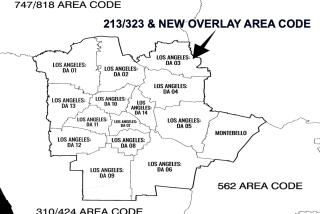. . . Never Mind That the Problem Doesn’t Exist
- Share via
Don’t believe the phone companies when they tell you that an area code split or overlay is necessary. It isn’t. Don’t let them divide you into pro-overlay or pro-split camps because neither is required.
There is no shortage of phone numbers, only mismanagement by those same phone companies. The California Public Utilities Commission estimates that of the 180 million numbers already distributed only 35 million are in use. In the 818 area code there are four possible phone numbers for every person, including infants, and unless we assume that the average family requires 16 phone lines there is no objective need for additional numbers.
According to Rebecca Barnhart, spokesperson for the North American Numbering Plan Administration, the group that administers area codes nationally, 1.65 million undistributed numbers are left in the 818 area code. Yet every time an area code is to be split or overlaid,the phone companies, led by Pacific Bell and GTE, deploy an army of consultants, lobbyists, lawyers and PR flacks to convince the public that this costly inconvenience is necessitated by increased phone usage. It isn’t.
The “shortage” referred to by those phone companies is one of their own design. It was Pacific Bell, which until last year was in charge of number distribution, that created the inefficient system of allocating numbers in blocks of 10,000 whether they were needed or not. As a result, most of those numbers are hoarded by the almost 200 phone companies now competing for your business. It was Pac Bell and other industry representatives that decided, in a meeting closed to the public, that a shortage exists in the 818 area code. Also kept secret are the data the public and the PUC need to make an informed decision on this matter.
Yes, the public resource of phone numbers has been turned over to the phone companies without any requirement that they report on the percentage of numbers acquired by them, free of charge, that are in actual use. Or that they return phone numbers that they have been unable to sell. The abject refusal of the phone companies to reveal the basic data needed to determine if there is a shortage mocks the right of the citizenry in a free society to make informed choices in matters concerning public policy.
Pacific Bell and GTE claim that public consent for these decisions was obtained at community meetings at which the alternative of overlay versus split was discussed. But never did they inform the public that such a choice might not be necessary--and by refusing to turn over the relevant data, they rendered those meetings totally beside the point. Neither did the phone companies reveal to the public that they are under a legal obligation as a matter of the 1996 Telecommunications Act to implement number portability, which would obviate the need for additional area codes. What number portability means is that you, the consumer, not the phone company, own your phone number. You have the right to keep that number even when you switch to a new phone provider. And you are paying for that right, whether you use it or not, with a monthly fee that will be tucked away in you phone bill for the next five years.
Number portability vitiates the argument of Pac Bell that it is technically necessary to allocate numbers in those inefficient 10,000-number blocks. Because an individual customer can be billed by one of a number of competing companies, there is no longer a need for only one company to control an entire prefix of 10,000 numbers as under the old system.
The Federal Communications Commission is considering a proposal from the PUC and seven other state regulatory agencies that they be permitted to distribute numbers in more efficient blocks of 1,000, which would, the FCC has predicted, extend the life of the current phone system 75 years without more area code splits or overlays. The FCC has also declared that if we continue down this road of ever more area code splits and overlays that we will run out of numbers within seven years and that it will cost $50 billion to $150 billion to add another digit to then fix the system nationwide. The sensible thing to do is to do nothing until the FCC has acted.
The 818 area code is not in danger of running out of numbers in the next 18 months, even under the current system. Hopefully the FCC will require phone companies to reveal what percentage of numbers are actually in use and to return the unused ones for redistribution to companies with customers that need them.
More to Read
Inside the business of entertainment
The Wide Shot brings you news, analysis and insights on everything from streaming wars to production — and what it all means for the future.
You may occasionally receive promotional content from the Los Angeles Times.










